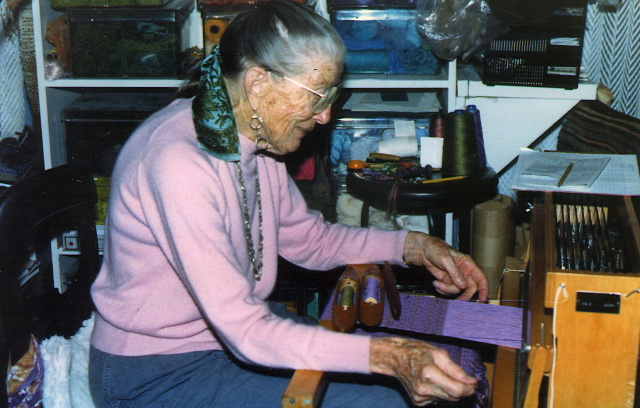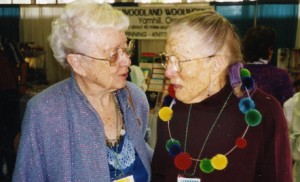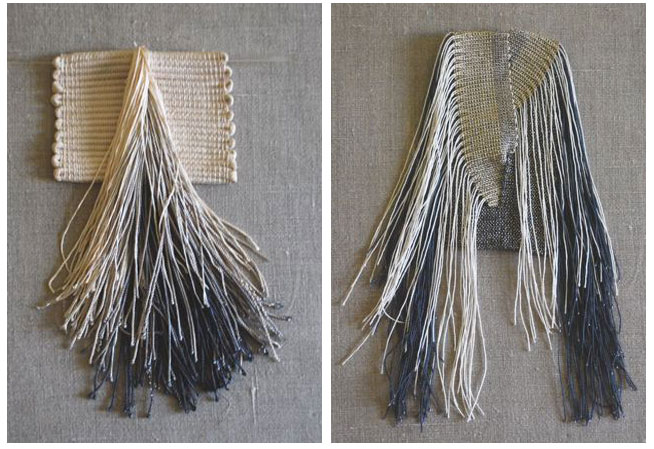Helen Pope was for many years a major influence on the Bay Area weaving community. She was a mentor, a patron, an inspiration, a fine weaver in her own right and, most of all, a teacher. Not in the formal, class room sense, but in the pose a question let the student figure it out sense. She belonged to several guilds and took classes, was part owner of a yarn shop and surrounded herself with people interested in fiber and fiber arts. In every situation she posed questions, discussed techniques and inspired beginning and experienced weavers to try new things. Her greatest accomplishment in inspiring the most weavers is the Special Sample Service.

The Special Sample Service began in 1979 as table decorations for the luncheon at the Conference of Northern California Handweavers. Helen asked well known textile designers for drafts and ideas, then she and the guild members wove the samples. Each swatch was complete with instructions and was limited to no more than eight shafts. The decorations were such a hit and disappeared so quickly from the tables, that Helen decided to continue the sample service as a part of every conference. She began asking weavers from Northern California to weave samples, write out the instructions and supply a number of copies. The samples were displayed at the annual conference and sold for a nominal amount. All the profits were donated to CNCH.

The Sample Service became one of the most popular attractions of the annual conference. The samples were displayed during the conference, with the sale beginning early Sunday morning. Interested weavers perused the selections, noting favorites and plotting strategy for the sale. The lines would form long before the sale opened with good natured competition for prized samples. Among the most sought after samples were Helen’s own creations which she called “Drips”. She would weave an interesting piece of cloth and then fold, stitch, crease, dye, perform all sorts of magic to make it a miniature art piece. All for $2.50. Once the sale started the competition heightened and the good nature got trampled, along with some of the sample service staff. In 1990, when Convergence was held in San Jose, the Sample Service made its first and only appearance at a Convergence. It was wildly popular. Over 30 guilds contributed almost 1,100 samples and the competition to purchase them was fierce.
Helen officially retired in the mid-90’s and Peggy Osterkamp took over the Sample Service, under Helen’s watchful eye. Since Helen’s death in 2000, the Special Sample Service has been headed by Sue Fandel, a friend of Helen’s who was not a weaver, but the sample service cashier. She was inspired by Helen and the samples to take up weaving herself.
With the alternative conferences occurring every other year, the Special Sample Service has also gone biannual, setting up only at the vendor conferences. What has not changed about the Special Sample Service is Helen’s original purpose. She felt that weavers should share their weaving to inspire and, in a sense, mentor new weavers. Having woven samples along with clear instructions gives not only the “recipe”, but also a piece of the fabric to see and touch. No photo, no matter how good, can replace having the actual cloth in hand to feel the drape and texture. In addition to the samples that are sold at the conference, one piece of cloth and the instructions from each sample is collected and saved in a notebook. Originally these books were kept at the American River College Library. That space is no longer available. Carol Graves of the Sacramento Guild is now keeping the notebooks and will send them out on request. The sample books have been all over the country inspiring weavers.
Before CNCH 2010 there was some concern that the Sample Service would not be able to continue. Interest had waned and there were very few samples contributed. The amount of enthusiasm shown at the conference, despite the lack of samples and very little publicity, has inspired the group to renew efforts to get people involved. Helen was able to collect a great many samples because she belonged to several guilds and classes and knew so many people. Combined with the force of her personality, no one ever said “No” to Helen. The Special Sample Service always had dozens of samples and a large crowd for the early Sunday morning sale. We’re hoping that by getting word out via the internet weavers who aren’t aware of what the sample service is will be interested in contributing, visiting the Special Sample Service booth at the vendor conferences and in checking out the notebooks of samples put together each year.
The Special Sample Service committee is already looking forward to 2012. Sue Fandel will accept samples any time, not just right before conference. Contributions should be 5 to 10 identical samples roughly 6 inches by 7 inches in size. Obvious exceptions are braids and inkle or card woven bands. Putting on a little extra warp is the perfect way to participate with practically no extra effort. Remnants from a project are fine. The samples need to be accompanied by a sheet of clearly written instructions including weave draft, materials, sett, finishing, proposed use and the weaver’s name. Listing the source or designer of the sample if it is someone other than the weaver is also helpful. The Sample Service Committee will make enough photocopies to accompany each sample. They will even cut the samples for you and reimburse you for materials if you ask them. We’re hoping to continue Helen Pope’s Special Sample Service for many years as a resource and inspiration.
Contact Sue Fandel about contributing samples at seesuerun2004(at)yahoo.com
Contact Carol Graves about borrowing sample books at imweaving(at)cwnet.com
Editor’s note: The sample books are filed by year and are inserted in the order received. They truly are a treasure and a valuable resource. I’m curious as to how guilds have used the sample books and how they could find a wider audience. Please send your suggestions to Sue or Carol or to me at editor(at)CNCH.org.
